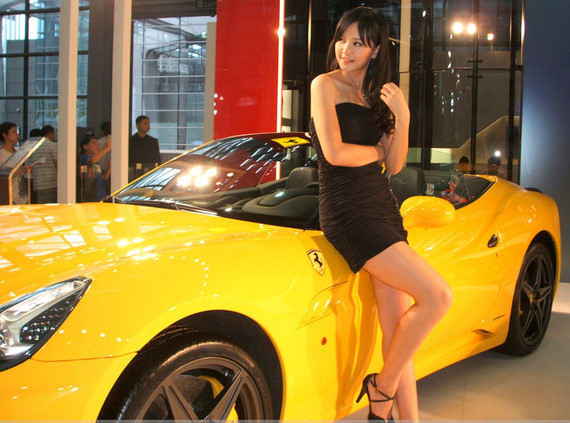
Photo. Liu Tian, a Shenzhener and Buick owner
SINGAPORE’S GROWING cost of vehicle ownership is driving some car lovers crazy.
But how do things compare to the on-the-street situation in one of China’s most important cities – Shenzhen?
The city, where I reside, is witnessing a rapid growth in motorists, which is contributing to making China the world's biggest auto market -- overtaking the US in 2008.
The China Association of Automobile Manufacturers (CAAM) said that for full-year 2010, automobile sales in China were 18,061,900 units, up 32.37% year-on-year, of which 13,757,800 passenger cars were sold, up 33.17%. Commercial vehicle sales last year rose 20.90 % to 4,304,100 units. Figures for individual cities were not available.
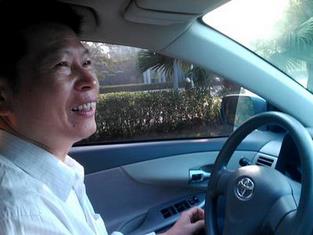
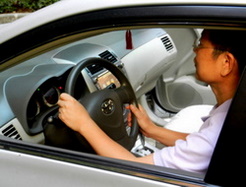
First of all, it is appropriate to say at this point that there is a substantial and growing (I hope) group of urbanites out there who simply have no interest in owning a car, and I count myself among them.
Parking places in Shenzhen – China’s most densely populated city – are jealously guarded commodities, and when found usually involve a long hike to your ultimate destination.

Auto insurance rates in China are revving up much faster than inflation, with market consultancy Tower Watson saying the sector is such a massive business in China that premiums for car owners makes up around 70% of total premium revenue for the entire insurance sector in the country.
Rates have as much to do with the value of the car as with the age, experience and safety record of the driver.
And with growth prospects remaining promising due to surging car sales and the recent introduction of compulsory auto liability coverage, auto premium revenue is expected to continue racing ahead.
Finally, there is the age-old adage that time is money.
I don’t know about you but sitting behind a wheel in thick traffic is just about the least productive (and boring) activity known to mankind. One can’t read, sleep or even drink coffee in peace (for fear of lap spills).
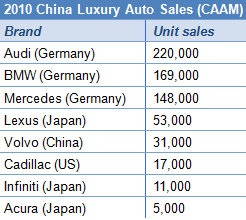
So the obvious alternative is public transportation, which allows a leisurely snooze on a bus or subway (provided you find a seat and have anti-pickpocket measures in place).
New York City Mayor Michael Bloomberg famously and faithfully rides the subway to City Hall each day. If it’s good enough for the billionaire mayor, why not for us?
Shanghai and Beijing own the fourth and fifth busiest subway systems in the world, with two billion and 1.8 billion annual passenger rides, respectively.
Hong Kong and Guangzhou round out the global top ten, and Singapore is at No.15 with 744 million passenger rides per year.
So what does the fact that Shenzhen doesn’t make the top 30 say about the city’s subway system? And its auto market?
It says a great deal, in fact, namely that its seven-year old system with seven lines, 137 stations and 178 km of track is a great way to get to work without feeling like a sardine.
Still insist on driving?
Okay, if you don't mind leaving a bigger carbon footprint as a legacy... also bear in mind that China is not your grandfather’s PRC these days.
The country, while still sporting some of the most polluted urban air quality levels the world over, is aggressively expanding its wind farms, solar panels, hydroelectric facilities – and green transportation.
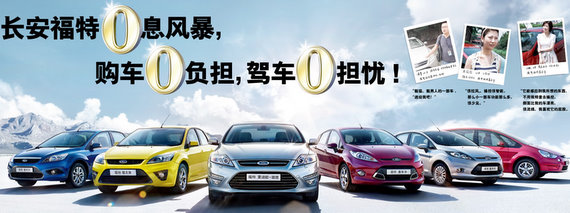
This means that if you want to pay more for a luxury vehicle with a more powerful, thirsty engine – you will also be paying the piper, i.e. the government, in the form of higher taxes.
Back in 2008, China began taxing cars based on their engine sizes, levying a prohibitive 40% sales tax on those with engines over 4.1 liters, a drastic doubling of the previous rate.
Meanwhile, engines between 3 and 4.1 liters were hit with a 25% tariff, up from 15%, and the rate for engines between one and three liters remained unchanged.
Finally, to reward those willing to putter along with engines smaller than one liter, the tax fell to just 1% from the previous 3% level.
Who’s in pole position?
A China auto sector study by Mercer last year revealed that foreign makes, due to their stronger brand awareness and quality image, enjoy a head start in the race to get buyers behind their wheels, despite blatant government support for domestic brands (including prohibitive taxes on foreign-made vehicles and 25% tariffs on imported auto parts).
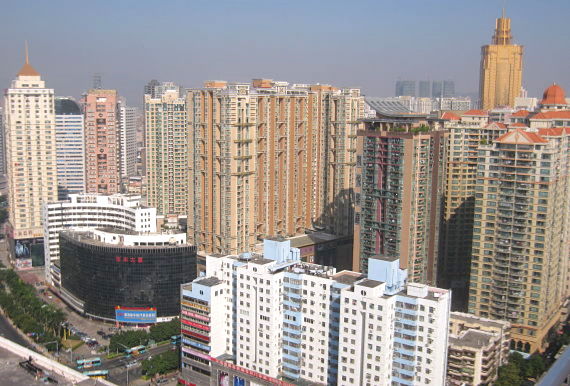
Foreign auto names also enjoy a clear lead in terms of customer satisfaction, Mercer showed in a survey.
More intriguing was the finding that brand awareness and brand loyalty are still at unnaturally low levels: only 25% of Chinese motorists opt for the same brand when buying second cars, compared to nearly 80% in North America and Europe.
This certainly has something to do with the fact that the US has just three domestic brands (up from two after Germany recently re-sold Chrysler back), whereas China’s domestic auto enterprises number over 6,000!
AltAssets added that brand loyalty in China for budget cars is even more scant, with just 7% of low-priced vehicle owners saying they planned to purchase the same brand again down the road.
Mercer also said that the prototypical Chinese customer for automobiles is a first-time buyer -- a finding which is certainly less true in relatively affluent Shenzhen – and the car is usually the largest investment ever made.
Safety, reliability, and low maintenance costs are the top demands of today’s Chinese car buyers and are much more important than list prices or rebates.
The Mercer study also reveals that Chinese buyers are willing to skip so-called “starter models” and aim directly at the mainstream bracket, with 29% maintaining that they want to buy a premium model in the future and 55% tending toward the mainstream category, which will therefore become the number-one growth segment in the Chinese automotive market.
Among all makes, BYD, Geely, Chery and Great Wall are four of the top pure domestic producers in China (with no JV affiliations) whereas VW, GM, Hyundai and Toyota typically win top market share honors among foreign brands.
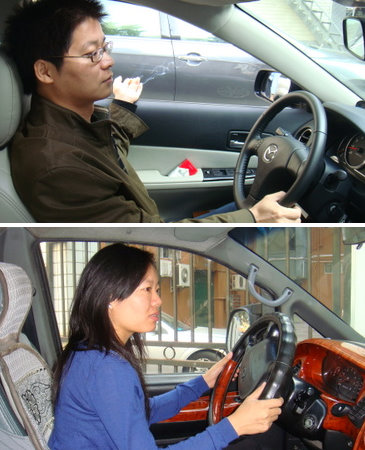
Ms. Fan (bottom), IT specialist, bought her 2.5L Hyundai new in 2006 for 120,000 yuan: "It’s affordable and easy to handle.” Pros: roomy, economical; Cons: more popular among taxi drivers; Next car: Lexus Photos: Andrew Vanburen
Of the dozen or so motorists I interviewed, only one purchased a second-hand vehicle, with most respondents saying they saw their cars as their home-on-the-road, and sometimes a place to rest.
"If possible, I will buy a new home when I can afford one, and that goes for this car too.
"I don't like to buy used cars, or beds. It's comforting to know I am the first to use them," said Ms. Liu, owner of a small Buick.
Talking to various car owners, I was struck by the range of prices they paid for their new vehicles, and all said that sticker prices were not so "sticky," with all interviewees bargaining down considerable from the asking price -- not exactly a rarity in China.
The same is true for used vehicle negotiations in Shenzhen, and here is a random online sampling of second-hand cars currently up for sale in the city:
* I'm selling my Toyota Previa that I bought in 2010. It has leather seats, rear parking sensors, a rear parking tv, and lots of great options. It is white and has online 6,500km, should you be interested in seeing the car before handling, contact me. (360,000 hkd)
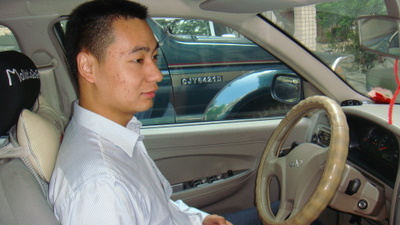
* BMW 320d Sport, 4 Door, Manual, Saloon, Diesel, 2005 54 Reg , 66,700 miles, Red, MOT-10-2012, 2 Owners. Up to 24 months warranty available. Will take part exchange and provide finance. Leather seats, ABS, Alloy wheels, Headlight washers, Immobiliser, Reverse parking aid. (70,000 yuan)
* Ford Focus 1.6 Zetec, 5 Door, Manual, Hatchback, Petrol, 2004, 52,985 miles, Metallic Silver, 2 Owners, Interest Free Credit Over 2 Years, Pay Nothing Until March 2012. (35,000 yuan)
Lack of brand loyalty, a willingness to shift styles and models with reckless abandon, yet a consistent trend to emphasize reliability and safety above all else was clearly evident in the sentiments of Mr. Huang, a career civil servant with the municipal tax bureau.
"I bought (my 2007 Toyota sedan) because alot of my colleagues had. I didn't feel pressured to buy a smaller car as the purchase came before the new government regulations. Besides, I work for the government. As for my next car, I am thinking, and hoping, for a Land Rover."
See also:
Counting the costs of living in SHENZHEN
BYD pulling out of auto biz? Buffett may too
PRC Developers' Financial Health; Auto Sector Rating Kept ‘Underweight’






